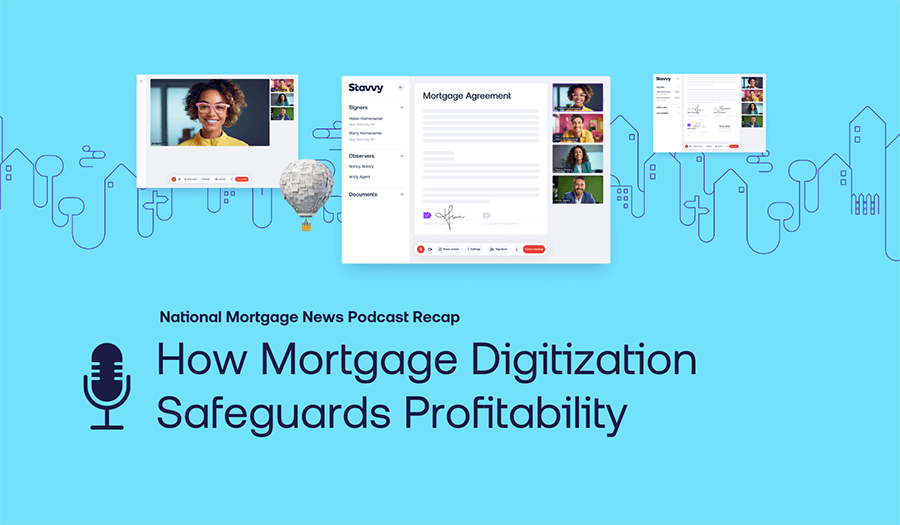New Jersey Remote Notarization: A Primer
In New Jersey, many documents require notarization to be legally binding — especially those revolving around real estate transactions. Mortgage originations, deed and title transfers, and closing sales documents all require a licensed notary’s seal of approval. Now all real estate professionals and their notary partners have a greater reach thanks to the state of New Jersey legalizing remote online notarization (RON).
Assembly Bill 4250, which took effect on October 22, 2021, added New Jersey to the list of official RON states. The bill allows New Jersey notaries to accept eSignatures and notarize electronic documents remotely.
For title companies interested in performing RON, their notaries must first notify the state of New Jersey.
Notification
Before performing their first RON transaction, a notary public must notify the State Treasurer electronically through the New Jersey Notary Public Application portal. Once in the portal, the notary identifies the technologies they intend to use.
Requirements for notarial acts using communication technology
Once notaries (or signing agents) have identified their preferred technologies for remote notarization in New Jersey through the state portal, it’s critical they are clear on the state’s RON requirements. Below are the requirements as stated in Assembly Bill 4250.
- The notary must be located in New Jersey, but the signer does not have to be in the state
- The notary must obtain satisfactory identification for the remotely located individual by personal knowledge or by visually verifying a proof of identity document and must use one of the three following methods of identity proofing to authenticate the individual’s identity:
- Dynamic Knowledge-Based Authentication (KBA) that is provided online by a third party (Note: Stavvy’s platform performs this for our customers)
- Biometric Identity Verification
- Digital Public Key Certificate issued by a trusted third party
- The notary must complete a certificate and stamp the certificate in accordance with the requirements
- The notary must create an audio-visual recording of the performance of the notarial act
Certificate and stamp requirements
Certificate shall:
- Be signed and dated by the notarial officer;
- Identify the jurisdiction in which the notarial act is performed;
- Contain the title of the office of the notary; and
- Indicate the date of expiration of the notary’s commission
The official stamp of a notary public must include the notary public’s name, the title “Notary Public, State of New Jersey,” and the notary public’s commission expiration date. The stamp must be able to be copied together with the record to which it is affixed or attached or with which it is logically associated. (Note: Stavvy’s platform will assist the notary with creating an official notary seal.)
Video and journal retention
A notary public must retain the journal for ten (10) years after the performance of the last notarial act chronicled in the journal.
Remotely located individual located outside of the United States
New Jersey notaries may perform RON for a remotely located individual who is located outside the United States, as long as:
- The record is to be filed with or related to a matter before a public official or court, governmental entity, or other entity subject to the jurisdiction of the United States or
- Involves property located in the jurisdiction of the United States and
- RON must not be prohibited in the foreign state where the individual is physically located.
Benefits of using RON in New Jersey
- RON can reduce costs and scale New Jersey mortgage origination and title and settlement businesses.
- Performing notary services remotely can increase customer volume through more efficient workflows. Additionally, RON users can reduce variable operational costs associated with paper-based systems. These two factors can increase margins for mortgage originators and title and settlement companies, helping them scale more effectively.
- Performing remote online notarization in New Jersey real estate closings enhances security measures.
- While there’s a stigma that digital tools are less secure, the truth is that utilizing a platform such as RON enhances security measures. The caveat is ensuring your RON provider complies with federal, state, and local regulations. Stavvy’s legal, industry, and regulatory teams work diligently to ensure its platform complies with New Jersey RON law. Also, our platform is certified MISMO® compliant, SOC 2 Type 2 compliant, allows notaries to use several means of identity verification and provides tamper-sealed transactional documents, digital audit trails, and secure meeting links.
- RON provides convenience and a better customer experience for real estate closings in New Jersey.
- Now that New Jersey is a RON-approved state, real estate professionals and their customers can transact from anywhere remotely. Providing this added convenience to a once arduous process can improve the overall experience and strengthen relationships.
- Adopting more digital mortgage closing solutions in New Jersey results in more sustainable business practices
- Going digital with RON doesn’t just save the trees, though it is a significant benefit. It also reduces your organization’s carbon footprint by reducing travel necessary by all parties involved in document signing/notarization and paper mail delivery. All these factors combined result in a more environmentally responsible organization.
Stavvy is a RON service provider in New Jersey
For mortgage originators, mortgage servicers, title companies, and other real estate professionals looking to expand their scope of services, Stavvy is here to help.
Stavvy is an intuitive, user-friendly eClosing platform for title and settlement companies, real estate attorneys, and their partners across the United States. Stavvy’s secure platform enables the digital submission, notarization, and delivery of real estate documents using identity verification, video conferencing, and digital signatures. These tools can help your organization reduce costs, increase productivity, and provide an exceptional customer experience.
Learn more about how the  is taking real estate beyond documents.
is taking real estate beyond documents.
Editor’s Note: The above outline is intended to provide general information and requirements about the process of becoming a RON notary and performing RON in New Jersey. For any additional questions or concerns, please consult the quoted websites or Notary Public Manual issued by the New Jersey Treasury, Division of Revenue and Enterprise Services.



![[Webinar Recap] Advancing Your Digital Default Servicing Strategy](https://blog.stavvy.com/hubfs/advancing-your-digital-default-servicing-strategy-blog-recap.png)